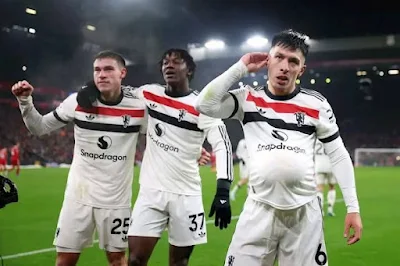This was the final match of the first half of the season for Liverpool and the opening match of the second half for Manchester United. Arne Slot will be hopeful that his own players won't appear as weak as they did here, while Ruben Amorim was given hope that perhaps things could improve for his side.
Up until that last moment, last month's Manchester derby didn't feel like the event depicted on the ticket. In order to provide a match that was worthy of its Liverpool vs. Manchester United billing, Manchester United considerably lifted their standards while Liverpool graciously dropped theirs.
In order to deny Liverpool time and space on the flanks, where Trent Alexander-Arnold, Mo Salah, and Cody Gakpo may be most effective, United used a good, wide, well-organized 5-4-1 strategy after learning from Tottenham's tactical errors against Liverpool.
The United midfield would retreat to within a few yards of the defensive line if Liverpool advanced to the final third. Once they had the ball, United would attempt to work it swiftly out to their own wings in order to launch a counterattack.
That worked out well, depriving Liverpool of a field of play on which they have won so many games this season. However, there may be a large gap between the United rearguard and the midfield during changes between the team's offensive and defense.
Liverpool felt they had the best chance of winning the game here, but they needed to move quickly and deliberately to get there. When they did so for the first time, it was because Luis Diaz dropped deeper and Ryan Gravenberch ran in to replace him. This resulted in Cody Gakpo shooting wide from a close range and Bruno Fernandes leading an investigation into how it had transpired.
Every time Liverpool attempted to open the space, the United sentries at the back grew a little more astute. Both Matthijs de Light and Harry Maguire were very good at closing down those passes as soon as they were received by stepping out if necessary; if their man was skilled enough to squirm free, the other would be across as cover quickly.
Liverpool were confused of how to react, which is unusual for them this season. It was almost as if United were pleading with them to put more players forward and give Rasmus Hojlund more room to roam.
When it worked for United in the first half, they ought to have capitalized more on the traditional rope-a-dope tactic. After racing past the Liverpool center-backs to get one-on-one with the keeper just before halftime, Hojlund lacked the composure to do anything but straight shoot at the oncoming Alisson. Amad Diallo also managed to put a diving header away from goal off a very presentable Diogo Dalot cross halfway through the first half.
Liverpool cannot claim that they were not warned about a generally slack performance, but they chose not to learn from the lessons, and the first goal highlighted all of United's strong points.
Dalot again gave Alexander-Arnold the opportunity to cross from the left, but Alexander-Arnold was far too ambitious in his attempt to find Salah on the halfway line, and Arne Slot was already frantically plotting with his assistants over an iPad to find a solution to a terrible start to the second half.
